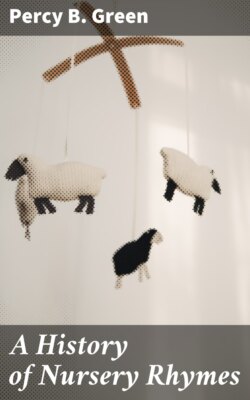Читать книгу A History of Nursery Rhymes - Percy B. Green - Страница 9
На сайте Литреса книга снята с продажи.
THE BABY'S RATTLE
ОглавлениеTable of Contents
at this juncture is worth according a passing notice, though degenerated into the bauble it now is.
Among the Siberian, Brazilian, and Redskin tribes it was held as a sacred and mysterious weapon. This sceptre of power of the modern nursery—the token primitive man used, and on which the Congo negro takes his oath—has lost its significance.
The Red Indian of North America had his Rattle man, who, as physician, used it as a universal prescription in the cure of all disease, believing, no doubt, that its jargon would allay pain, in like manner as it attracts and soothes a cross child; and this modern type of primitive man, the Red Indian, although fast dying out, has no obscured visions of the records of childhood; they have remained since his anno mundi ran back to zero. To him the great sources of religious and moral suasion which gave birth to mediæval and modern Europe, and so largely contributed to the polity of Asia and the upraising of Africa, have been a dead letter, which spell his extinction. He lived up to his racial traditions, and is fast dying with them. His language, his arts, his religious rites are of an unfamiliar past.
Leaving the Red Indian moon worshipper with his death rattle awhile and harking back to Europe, Norway stands out as the richest country in legendary lore, for old-time superstitions have lingered among the simple and credulous people, living pent up on the horrid crags, where torrents leap from cliff to valley. Their tales of goblins and spirits, tales of trolls, gnomes, and a legendary host of other uncanny creatures, point to the former nature and ancestral worship of a people cut off from the advancing civilisation of their time. Luckily for the archæologist, superstitious beliefs and folk-lore tales have preserved the graves of the Stone Age inhabitants of the country from desecration. As in Norway so in the Isle of Man, and in the western districts of Ireland.
In Man until the fifties many of the inhabitants believed in the Spirit of the Mountains; indeed, even in County Donegal and the West Riding of Yorkshire, up to the last twenty years, fairy superstition was rife. Boyd Dawkins gives in his chapter, "Superstition of the Stone Age: Early Man in Britain," an account of an Isle of Man farmer who, having allowed investigation to be made in the interests of science on portions of his lands, becoming so awed at the thought of having sanctioned the disturbing of the dead, that he actually offered up a heifer as a burnt sacrifice to avert the wrath of the Manes. After lunar and solar worships this ancestral worship of the Isle of Man farmer ranks next in point of age, a survival of which is seen in the respect paid by country people to the fairies, the goblins, and the elves. Equally so has the spirit of former beliefs been handed down to us in the song of the nurse, and in the practices of rural people.
A modernised lullaby of a Polish mother bears traces in the last stanza of a quasi-native worship—
"Shine, stars, God's sentinels on high,
Proclaimers of His power and might,
May all things evil from us fly;
O stars, good-night, good-night!"
Other instances of nature worshippers are amusing as well as being instructive. The Ojebway Indians believe in the mortality of the sun, for when an eclipse takes place the whole tribe, in the hope of rekindling the obscured light, keep up a continual discharge of fire-tipped arrows from their bows until they perceive again his majesty of light. Amongst the New Caledonians the wizard, if the season continue to be wet and cloudy, ascends the highest accessible peak on a mountain-range and fires a peculiar sacrifice, invoking his ancestors, and exclaiming—
"Sun, this I do that you may be burning hot,
And eat up all the black clouds of the sky,"
reminding one of the puerile cry of the weather-bound nursery child—
"Rain, rain, go away,
Come again another day."
Wind-making among primitive people was universally adopted; even at a late period the cultured Greeks and Romans believed in a mythical wind god.
It was the custom of the wind clan of the Omahas to flap their overalls to start a breeze, while a sorcerer of New Britain desirous of appeasing the wind god throws burnt lime into the air, and towards the point of the compass he wishes to make a prosperous journey, chanting meanwhile a song. Finnish wizards made a pretence of selling wind to land-bound sailors. A Norwegian witch once boasted of sinking a vessel by opening a wind-bag she possessed. Homer speaks of Ulysses receiving the winds as a present from Æolus, the King of Winds, in a leather bag.
In the highlands of Ethiopia no storm-driven wind ever sweeps down without being stabbed at by a native to wound the evil spirit riding on the blast. In some parts of Austria a heavy gale is propitiated by the act and speech of a peasant who, as the demon wings his flight in the raging storm, opens the window and casts a handful of meal or chaff to the enraged sprite as a peace offering, at the same time shouting—
